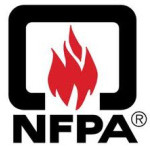- Industry: Fire safety
- Number of terms: 98780
- Number of blossaries: 0
- Company Profile:
Established in 1896, NFPA's mission is to reduce the worldwide burden of fire and other hazards on the quality of life by providing and advocating consensus codes and standards, research, training, and education.
Minimum mass of a specific aerosol-forming compound per cubic meter of enclosure volume required to extinguish fire involving particular fuel under defined experimental conditions excluding any safety factor.
Industry:Fire safety
Mill waste consisting mainly of hogged bark but possibly including a mixture of bark, chips, dust, or other by-products from trees; also includes material designated as hogged fuel.
Industry:Fire safety
Microorganisms that can produce infection and/or cause disease in humans after being inhaled.
Industry:Fire safety
Microorganisms that are present in human blood and can cause diseases in humans.
Industry:Fire safety
Microorganisms such as a bacteria, virus, or fungus that is capable of causing disease.
Industry:Fire safety
Methods used to secure ignition sources at an incident scene that can include hose line placement and utilization of chemical agents to suppress fire potential.
Industry:Fire safety
Methods that utilize breaking and cutting tools to create safe openings in masonry, concrete, and wood structures.
Industry:Fire safety
Methods that are based on the ability or need to quantify either the likelihood or the consequence of a fire event or events.
Industry:Fire safety
Metals that are related closely to each other in the galvanic series.
Industry:Fire safety
